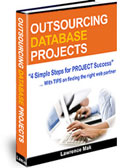Oracle
| Questions |
Advantages of Oracle Databases
Disadvantages of Oracle Databases
Who Is Oracle Database For?
| Don’t you, at times, think about how banks run their processes so smoothly and flawlessly? |
Well, thanks to Oracle databases, most banks are able to manage our critical information securely and flawlessly. Oracle databases are all about robustness, power and exceptional data maintaining capabilities. You hardly hear about an Oracle database crashing or messing up with the data!
While security and reliability are, definitely, a big ‘yes’ for Oracle databases, the complexity involved with programming and deployment are definitely a ‘fear factor’. Therefore, you typically find Oracle installed in large corporations. It fails to find friends in small or medium enterprises.
Advantages of Oracle Databases |
top |
As mentioned, security and performance are the highlight of Oracle databases. Some of the other advantages are:
- Isolation: Oracle databases perform each transaction in isolation from others, which ensure higher level of security.
- Durability: Once all the transactions are complete, the results are permanent and survive media failures.
- Recycle bin option: The latest versions of Oracle databases have a recycle bin option. This works exactly like the Microsoft Recycling Bin.
- Perfect for large data size: While MySQL may flutter when the data size goes up, Oracle is the ideal choice of database for such conditions.
Disadvantages of Oracle Databases |
top |
Even the most technically sound professionals find Oracle databases challenging. Some of its major disadvantages are:
- Budget: Oracle databases are feasible only when you need large databases. With the amount of work and hardware needed to deploy, it is not ideal for small or mid-sized companies where other feasible options such as MySQL or Microsoft SQL can be more cost effective with similar functionality.
- Complexity: You don’t want to deploy a database that has a huge learning curve. Oracle databases are notorious for their complexity and therefore not the ideal choice when either the workforce isn’t highly technical or you want an easy-to-use database with basic features.
Who Is Oracle Database For? |
top |
Think of huge ‘Giga’ or ‘Tera’ bytes of data and think of oracle databases! Oracle databases are an ideal choice for organizations such as banks, mortgage companies, or other large enterprises where a lot of concurrent users need access and constant change in the database needs to be recorded. Oracle databases are not the ideal choice for people with lesser data storing needs as other databases such as MySQL or MS SQL suffice.


